Alumni and friends celebrate Australian ties
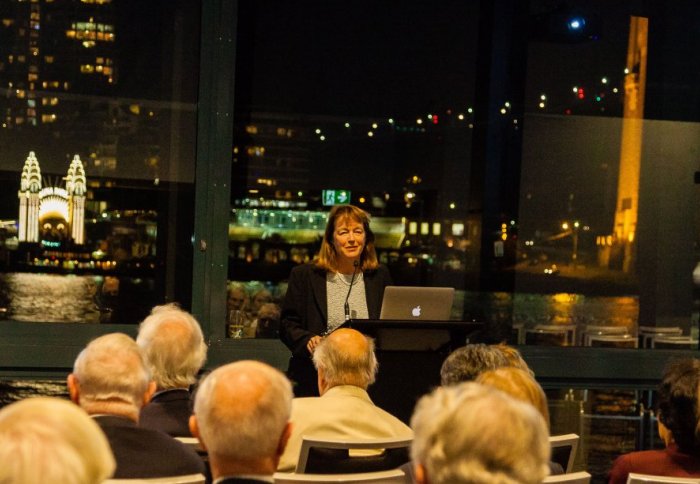
Alumni and friends gathered at two major receptions in Sydney and Perth last week.
Imperial's President Alice Gast met more than 100 members of the College's 1,600-strong Australian alumni community, along with friends, partners and collaborators.
 At Sydney's Pier One and Perth's Pan Pacific, Professor Gast showcased some of Imperial's recent research partnerships with Australia, including work with the University of Queensland to combat antimicrobial resistance. In the last five years alone, Imperial academics and their Australian colleagues published 3,000 high impact research papers.
At Sydney's Pier One and Perth's Pan Pacific, Professor Gast showcased some of Imperial's recent research partnerships with Australia, including work with the University of Queensland to combat antimicrobial resistance. In the last five years alone, Imperial academics and their Australian colleagues published 3,000 high impact research papers.
President Gast said "Thank you for building a network of support for Imperial." She updated the community on recent College successes "like Dave Henson who is defining excellence in new and unexpected ways." After losing both legs serving in Afghanistan, Captain Henson helped found the Invictus Games and won bronze in the Rio Paralympics. His PhD "work in biomedical engineering is coming up with solutions for others with amputations and knee injuries. He is an inspiration and we are very proud."
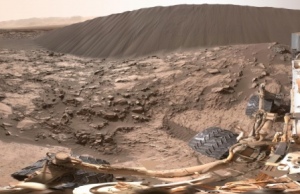
Imperial's Data Science Institute has shown new depths to Mars Rover images
President Gast also highlighted the Data Science Institute's phenomenal visualisation capabilities, recalling a "wonderful" moment where "grown geologists cried at the great resolution and fine detail of grains of sand on Mars from the Rover mission."
Having fun, working hard
In Sydney, Peter Mance (Physics 1981), looked back fondly on his time being taught by Tom Kibble, one of the all-time great theoretical physicists and teachers, who died earlier this year.
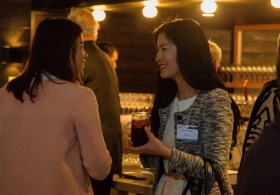 Mr Mance, a retired technologist, whose varied career included work with the BBC on early satellite television, maintains a keen interest in science. He recently visited Antarctica, seeing first hand the alarmingly rapid impact of climate change - another area where Imperial's collaborations with Australian institutions have driven forward understanding.
Mr Mance, a retired technologist, whose varied career included work with the BBC on early satellite television, maintains a keen interest in science. He recently visited Antarctica, seeing first hand the alarmingly rapid impact of climate change - another area where Imperial's collaborations with Australian institutions have driven forward understanding.
He led a busy academic and extracurricular student life, including as a rower for ICBC's second eight, "borrowing" boats in the Serpentine, and the odd trip to local pubs. He said: "I loved Imperial. I would advise current students to make the most of being at one of the world's best universities: have fun and work hard."

Musical memories
Professor Martin Bennett (Chemistry 1957, PhD 1960) said "Some people really inspired me at Imperial. I was taught by Geoffrey Wilkinson before he won the 1973 Nobel Prize in Chemistry."
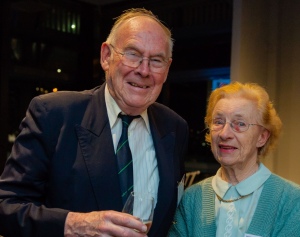
Martin and Rae Bennett
Professor Bennett met his Australian wife, Rae, in London at a Victoria League for Commonwealth Friendship social event. The couple took full advantage of London's cultural scene, regularly attending student concerts at Imperial's neighbouring institution, the Royal College of Music.
The best thing I ever did is go to Imperial
– Professor Alice Vrielink
PhD Physics 1989
Dr Alun Roberts (Metallurgy 1970, PhD Mechanical Engineering 1973) said "my experience of Imperial wasn't just science and engineering, but art and music too." Dr Roberts chaired Imperial's choir, when they played the first ever concert in the Great Hall. As a student, he was inspired by Professor Eric Brown "a pioneer in Imperial's music history. He was a dynamo not only in civil engineering but also in music."
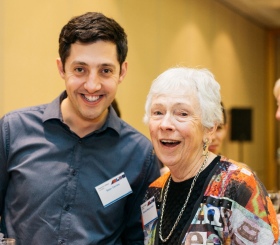 Rachel Fowler (Civil Engineering 1988) was also influenced by fellow Imperial musicians. She chaired the orchestra, working with Dr Richard Dickins, who is still at the College as Director of Music and the Blyth Centre after more than 30 years. "Richard was so energetic and inspirational. He was great at bringing musicians and scientists together, with wonderful connections to the Royal College of Music," she said. Ms Fowler's other memories of student life include "when I shot a rifle in the basement of Weeks Hall... for the Rifle Club."
Rachel Fowler (Civil Engineering 1988) was also influenced by fellow Imperial musicians. She chaired the orchestra, working with Dr Richard Dickins, who is still at the College as Director of Music and the Blyth Centre after more than 30 years. "Richard was so energetic and inspirational. He was great at bringing musicians and scientists together, with wonderful connections to the Royal College of Music," she said. Ms Fowler's other memories of student life include "when I shot a rifle in the basement of Weeks Hall... for the Rifle Club."
In Perth, Professor Alice Vrielink (PhD Physics 1989) explained how she came to Imperial from Canada as a Royal Commission for the Exhibition of 1851 scholar. This gave her access to concerts at the Royal Albert Hall: "I would knock on a commissioner's door and get tickets for Dire Straits, Eric Clapton, Tom Jones and the Proms." She added: "The best thing I ever did is go to Imperial: it has endless science, people and opportunities. I was very privileged to go."
Mould breakers
Two Sydney alumni, Dr Marlene Kanga (MSc Chemical Engineering and Chemical Technology 1977) and Kay Nagendra-Meynard (MBA 2014), discussed the challenges of achieving gender equality in male-dominated professions.
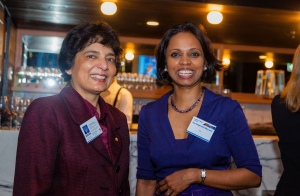
Marlene Kanga and Kay Nagendra-Meynard
Ms Nagendra-Meynard, who met her husband at Imperial and just last year "had an Imperial baby", is a successful consultant with a background in engineering. Now based in Sydney, she was instrumental in supporting mentoring schemes like STEMNET, inspiring young people in science, technology, engineering and medicine, and MentorSET for women in STEM.
Don't let anyone tell you it's a man's world
– Kay Nagendra-Meynard
MBA 2014
Dr Kanga is president elect of the World Federation of Engineering Organisations and a global advocate for women in engineering. Having studied and forged a career when few women worked in chemical engineering, Dr Kanga noted that in countries with newer engineering sectors, like Malaysia, "the cultural barriers for women are not there. You reach a critical mass" away from the less progressive traditional expectations around women in engineering that persist in the west.
 Ms Nagendra-Meynard said: "As someone interested in entrepreneurship and a flexible work-life balance, people like Marlene are inspirational. "Lots of kids want careers in engineering but are discouraged from entering a 'man's world'. This happened when I started studying civil engineering. You should ignore this idea, go your own way and go after your passion. Don't let anyone tell you it's a man's world."
Ms Nagendra-Meynard said: "As someone interested in entrepreneurship and a flexible work-life balance, people like Marlene are inspirational. "Lots of kids want careers in engineering but are discouraged from entering a 'man's world'. This happened when I started studying civil engineering. You should ignore this idea, go your own way and go after your passion. Don't let anyone tell you it's a man's world."
Dr Kanga added: "We need to change the narrative for potential engineers. People often don't understand what engineering is and the impact they can have, and the difference they can make. We need to talk more about the impact of engineering."

Rich heritage
President Gast highlighted the College's proud "roots in the 1851 Great Exhibition and in the Royal School of Mines, Royal College of Science and City and Guilds College," all of which forged close connections with Australia in Imperial's early years.
50 years ago you had to work in science to know Imperial. Now everyone knows it.
– Dr Ian Merker
EEE 1967, PhD Metallurgy 1968
The Sydney-based Imperial College Alumni Association of New South Wales was founded by Royal School of Mines alumnus Brigadier Richard 'Dickie' Foot, a veteran of both world wars, who took a BSc in 1914 and PhD in 1919.
Fellow alumnus Ron Butler (Materials, 1952) attended the reception, where he was applauded for his ongoing leadership of the NSW group. Mr Butler, who became friends with Brigadier Foot, helped the group to thrive after its founder's death in the late 1960s. He explained: "The group became much more active in the middle '60s, when Australia was experiencing its first nickel boom, and qualified young engineers of all types were needed. A programme was set up to sponsor English students for vacation work. As many as 100 students including RSM students came each year in a chartered Qantas 707 to Sydney. Our local group welcomed the arrivals and put on a party before sending them off to work in mine camps around the country. I became involved in helping Dickie Foot to organise these visits."
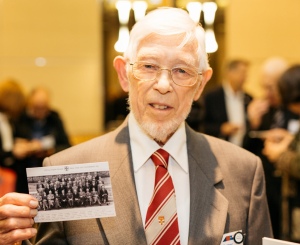
Dr Peter Palmer in Perth
In Perth, Alan Dickson (Mining and Mineral Technology 1968) spoke about the regular alumni events he had been attending and helping to organise in Western Australia since 1978. Another Perth alumni leader Dr Ian Merker (Electrical Engineering 1967, PhD Material Sciences 1972), Chairman of the Imperial College Alumni Association of Western Australia, gave a vote of thanks in Perth. He said: "50 years ago when I was at school and considering university, you had to work in science to know Imperial. Now everyone knows it: it's amazing how much the College is quoted in the media now. That shows Imperial's excellence."
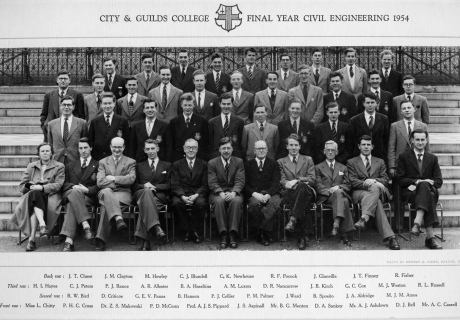
Dr Peter Palmer (Civil Engineering 1954, DIC 1957) shared memories of Imperial in the 1950s, including a photo (above) of his City and Guilds College Civil Engineering cohort graduating in 1954. He ascribes much of his career success - which involved tunnel, dam and bridge design in places like the Snowy Mountains and Mekong River - to Imperial.
Extracurricular growth
During the Perth drinks reception, Dr Ian Merker, who recently returned to his old stamping ground of Weeks Hall after half a century, remembered fun student days, which included "illegal trips up the Queen's Tower".
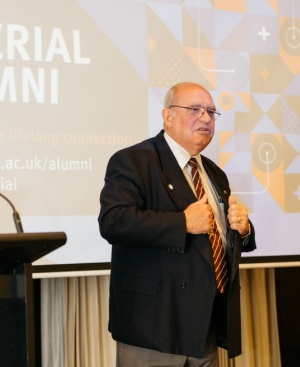
Alan Dickson in Perth
Patrick Bruce (Civil Engineering 1960) thinks he enjoyed his Imperial days even more. "We students of the 1950s had the best of times. We got up to all kinds of pranks, like sending a loop of students over a pedestrian crossing by the Albert Memorial, having pyjama parties on the Circle Line, and flour fights during Morphy Day boat races. Britain after the war had a feeling of release; we were free and finally getting somewhere as a country."
Dr Peter Gregory (Mining and Mineral Technology 1965, PhD Geology 1968) said "Imperial is a great place to grow, learn and be with peers who will push you." He was president of the Caving Club and helped run the Mountaineering Club: "Imperial offers so many extracurricular activities, you build up bonds for life with other students. There's more to Imperial than academics - it turns out a well-rounded person."
Alumni wishing to find out more about the groups in Australia can get in touch with the Alumni Office: alumni@imperial.ac.uk
Article text (excluding photos or graphics) © Imperial College London.
Photos and graphics subject to third party copyright used with permission or © Imperial College London.
Reporter
Andrew Scheuber
Communications Division